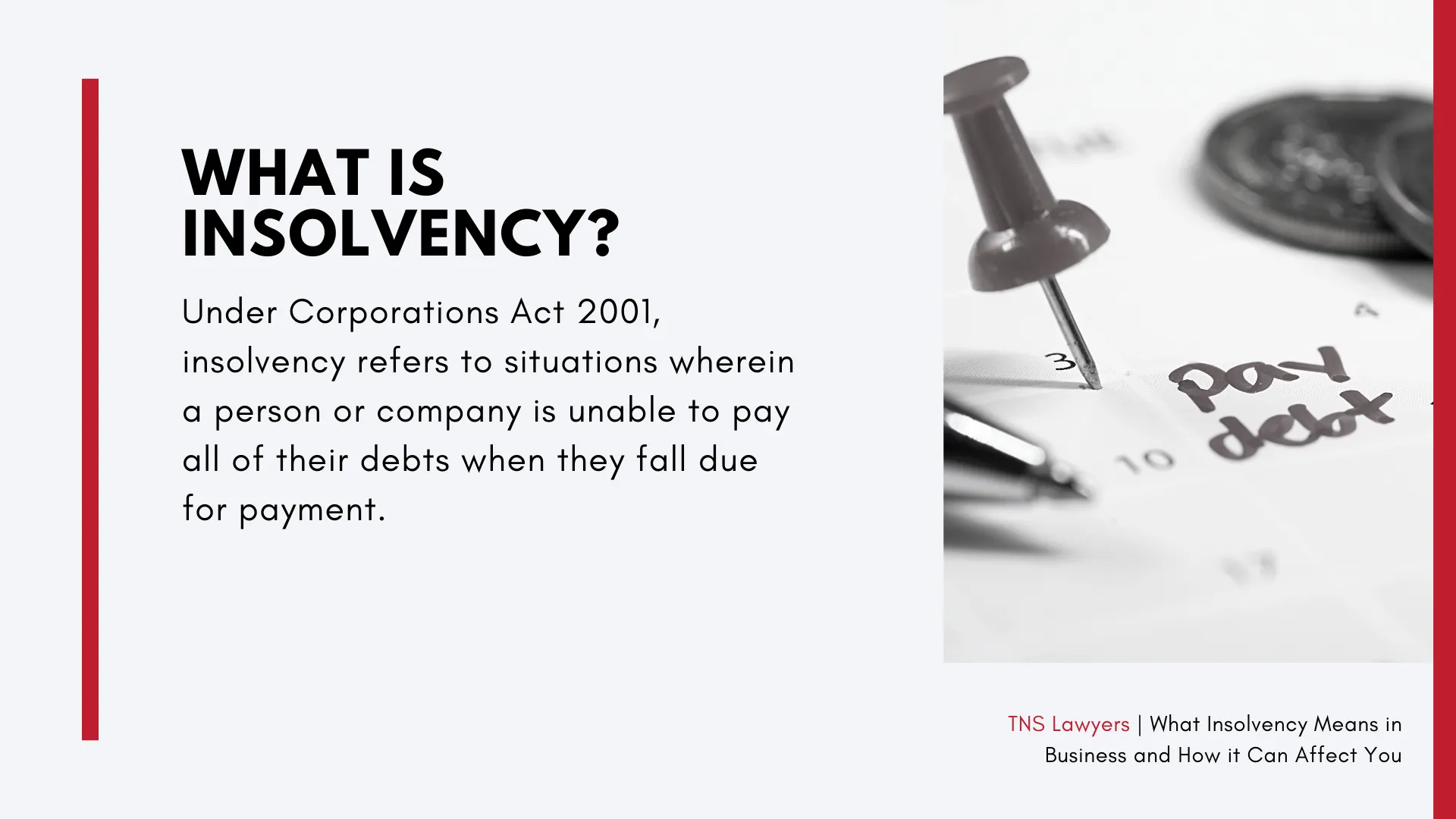The Basic Principles Of Insolvency Practitioner
The Basic Principles Of Insolvency Practitioner
Blog Article
How Insolvency Practitioner can Save You Time, Stress, and Money.
Table of ContentsExcitement About Insolvency PractitionerThe Definitive Guide to Insolvency PractitionerThe 30-Second Trick For Insolvency PractitionerThe 20-Second Trick For Insolvency PractitionerThe Greatest Guide To Insolvency PractitionerThe 6-Second Trick For Insolvency PractitionerThe Basic Principles Of Insolvency Practitioner
Insolvency is when responsibilities are higher than the worth of the business, or when a borrower can not pay the debts they owe. A company can end up being bankrupt due to a number of scenarios that lead to inadequate money circulation. When confronted with insolvency, a company or person can speak to lenders directly and restructure financial obligations to pay them off.
Service owners might get in touch with creditors directly and restructure financial debts into even more workable installments. Lenders are generally responsive to this strategy since they desire to be paid back and avoid losses, even if the settlement is on a delayed routine.
The owner develops a proposition detailing how the debt may be reorganized utilizing cost decreases or other prepare for assistance. The proposal shows financial institutions exactly how the company might produce adequate capital for profitable operations while paying its financial debts. Typically, a forgiven financial obligation might be taken into consideration earnings by the Irs (INTERNAL REVENUE SERVICE).
Facts About Insolvency Practitioner Revealed
When a business needs to pay enhanced prices for products and services, the firm passes along the cost to the consumer. As opposed to pay the enhanced expense, several customers take their organization in other places so they can pay less for a product and services. Losing customers leads to shedding revenue for paying the business's lenders.
Business may wind up paying huge quantities of money in problems and be unable to continue operations. When operations discontinue, so does the company's earnings. Lack of earnings results in unpaid costs and lenders requesting cash owed to them. Some business end up being bankrupt due to the fact that their products or solutions don't advance to fit consumers' transforming demands.
Indicators on Insolvency Practitioner You Should Know
Expenses go beyond revenues and expenses continue to be unpaid. Kinds of insolvency consist of cash-flow insolvency and balance-sheet bankruptcy. Cash-flow bankruptcy happens when a business has the possessions to cover their debts however they remain in the wrong type, such as realty rather of liquid funds. Balance-sheet bankruptcy, on the other hand, suggests an absence of assets in any type to cover financial debts.
The IRS states that an individual is financially troubled when the total responsibilities exceed total possessions. Insolvency Practitioner. A personal bankruptcy, on the other hand, is a real court order that depicts just how a bankrupt person or organization will repay their lenders, or just how they will certainly offer their properties in order to make the repayments
Getting My Insolvency Practitioner To Work
If that situation expands longer than prepared for, it can bring about bankruptcy. navigate to these guys When a company or person is financially troubled, they can not fulfill their economic responsibilities. Solvency is when you have adequate funds to cover the settlements you owe. A company is considered solvent when they have much more possessions than responsibilities.

Recognizing the aspects that can cause insolvency, such as overspending, can help you prevent insolvency and its effects.
The smart Trick of Insolvency Practitioner That Nobody is Discussing
It is well recognized that directors and policemans of firms (and supervisors of restricted responsibility business) owe fiduciary obligations to their organizations and their shareholders (or members). These fiduciary commitments are defined by state laws and, though there are variants from one state to another, they normally include an obligation of commitment and a task of care.
The task of treatment calls for directors and officers to work out diligence, to make educated choices, and to act in excellent belief so that their actions are in the most effective interest of the company. Beyond the extent of this discussion, some states enable these responsibilities to be restricted either by so keeping in mind in the organizational papers or conforming with various other needs.
Insolvency Practitioner Fundamentals Explained

Beware regarding providing investors he said favoritism at the expense of creditors (e.g., accrediting and moneying a reward or a supply redemption). Take care about preferential therapy in between classes of shareholders. Make sensible efforts to discover all the truths before taking a particular course of activity; directors should truly believe that any choices made remain anonymous in the finest interests of the corporation in its whole (i.e., decisions will be reviewed in hindsight in light of the effect of such activities on the firm).
In any kind of insolvency or bankruptcy case, settlements made to specific creditors at the cost of other creditors can be clawed back, specifically if there is some connection in between the business and the financial institution. Take into consideration proposing at a yearly shareholder conference (or any type of other meeting of investors) a resolution affirming that all previous service decisions and actions taken by the directors and police officers of the corporation were absorbed excellent belief after a workout of practical treatment.
Insolvency Practitioner Fundamentals Explained
Completely reveal any type of individual or business relationships with events beyond of transactions including the firm to avoid the appearance of a problem of passion. In examining possible fund elevating purchases or a sale of assets of the distressed company, realize that these purchases might be scrutinized later because of any type of succeeding development of supervisors' fiduciary duties to include financial institutions.
Report this page